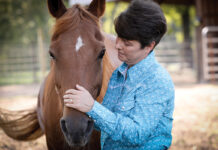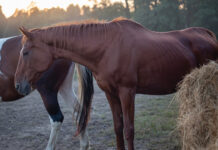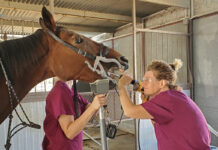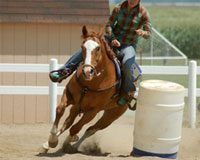Twenty is the new 15 when it comes to today’s horses. With advancements in veterinary medicine and good horsekeeping practices, senior equines are proving that age is just a mindset. Keeping your mature horse going strong takes commitment on your part, but the payoff is partnership for years to come. Use these tips to help keep your veteran young at heart:
A Purpose in Life
Read more about riding your senior horse >>
 |
| With proper care, nutrition and conditioning, senior horses can thrive in second careers well into their 20s and beyond. Photo: Leslie Potter |
Keep Him Moving
Tucking your senior into his cozy stall that’s bedded up to his belly may help you rest better, but it’s probably not best for him health-wise. To help ward off ailments such as arthritis, obesity and respiratory disease, keep his body in motion with plenty of turnout—optimally, 24/7—for a healthier lifestyle.
More Than a Fleeting Glance
Use your eyes to stave off potentially life-threatening problems by giving your horse a daily once-over. Ask yourself: Is he eating/drinking/behaving like normal? Does he have any wounds, bumps, swelling, skin problems or hoof maladies that need attention? Is he bright and alert? Is he moving out as usual? Seniors don’t always bounce back as quickly from injury or illness, so don’t hold off on treatment. And don’t wait to call your vet if the situation looks serious.
What’s On the Menu?
Stemmy, poor-quality hay, weedy pasture and sugary grains … these are less than ideal food choices for an aging horse because they won’t meet his nutritional needs. As horses age, their digestive systems become less efficient, and their ability to absorb and utilize essential nutrients in their feed, especially protein, phosphorus and fiber, decreases. Make smart menu selections, such as good pasture grass supplemented with high-quality hay that is easy to chew and digest, along with complete feeds designed for the senior horse. If your old guy has dental problems—hence chewing problems—you’ll have to accommodate him with complete senior feeds and/or hay pellets. Talk to your veterinarian about any special supplements to round out the menu.
Read more about nutrition for the older horse >>
Dental Detail
“Mature” horses need thorough dental exams at least once a year, whether there are signs of problems or not. Besides a float, an equine dentist will look for diseases that afflict older horses, such as periodontal disease and tooth decay. If you put off your horse’s dental appointment, you could be risking his health. By the time you notice a problem—trouble chewing and dropping food, which lead to weight loss—it may be too late: Tooth surfaces that are severely uneven can be impossible to fix.
Pull Blood
Regular vet visits, which should include blood work, can help ward off disease in your older horse. Cushing’s disease, liver and kidney problems, anemia, electrolyte imbalances, insulin resistance, and other senior horse disorders can be detected with blood tests. Hands-on examination can monitor old-age conditions, such as eye disease, dental issues, weight loss, et cetera.
Balanced for Soundness
Reducing your aged horse’s workload doesn’t mean you can cut back on his hoof care. Even if he’s retired to pasture, he still needs trimming/shoeing every six to eight weeks. Keeping hooves balanced can be even more critical in the aged horse that suffers from debilitating diseases like arthritis, navicular or laminitis, and your farrier can also alert you to any unforeseen hoof problems that might be brewing.
Asset Protection
Lack of shelter during bad weather, pesky parasites, disease and herd rivals are detrimental to your senior’s immune system. Don’t let him slip: Always provide protection from rain, wind, heat and frigid conditions; stick to a regular deworming program; keep up on insect control; and vaccinate on time.
That’s What Friends Are For
Allow your neighborly oldster to flaunt his social skills by giving him equine friends. Letting him partake in normal horseplay with his own kind will improve his quality of life and may just help him live longer. Make sure his pals are well-matched to his “mature” personality to minimize injury and ensure he gets his fair share of food and water.
Lots of Lovin’
While edible treats are fine now and then, give them in moderation. Instead, overindulge him with extra pats and praise for everything that makes him so special. Added benefits: He’ll be more eager to please, and spoiling him rotten this way is good for your emotional well-being.
This article originally appeared in the November 2005 issue of Horse Illustrated. Click here to subscribe.






I have a 27 year old Walking Horse mare that acts about half her age. Her purpose in life is teaching my mom how to ride and enjoy horse shows, her routine medical care is up to date and she is happy. The barn where I board has mostly geriatric horses and they are all well cared for by the barn manager there.
I have a 25 yr old AQHA gelding who acts like he’s 10. We compete in barrel racing and pole bending, and we always place in the top 6. Most of the horses there are half his age, and we still beat some of them!
I think it is a very good article. I think many people wonder how they can add yeard to their horses life and not many of them can find any information. Ithink this article would be very helpful.
I’m happy to say that I’m doing everything this article states to keep my oldster happy and healthy. Must be why he’s still going strong at 37 years.
This article is a very good, general guideline to follow for senior horses.
loved it! my cousin has 3 geldings 21, 18, and 20 she could use all of this info.!
great article!!
good info
Great tips that everyone should follow. I was happy when I read the article because those ideas are what I keep in mind with my horse. I read the comments below and “Megan’s” on Aug. 27/07 stood out to me – stating her equine friend is 37 years old! WOW, hope he is still going strong and I will be blessed if my gal is around at 37!!!!!
Wow! I never thought about getting blood work done on my 18-19 year old mare. Maybe kidney failure could have been detected in my friends horse. Even though she never showed any signals of getting old. Just in the last couple of months of her passing. This would be even a good idea to do when you first buy ANY horse. I agree with all this information. Every horse owner should follow the guidelines no matter what the horses age. I hope I can prevent my mare from having a healthy years to come. 😀
That is so true, and it really works! The most important part is keeping your horse active throughout his/her life!
I have a 24-year-old QH gelding, and it is SO true that keeping them active makes a difference. I make sure that he has at least two days off a week, but otherwise, I take him for a good 30-45 minute ride in the arena. The best advice I could give someone is to always change what you do in the arena. Sometimes, I just take Stoney through his paces; but there are days that we work on his leads, backing up, Equitation patterns, and occasionally VERY low (6-10″ max) jumps. It keeps him fit both mentally and physically! No one ever believes me when I tell them how old he really is!
My twenty eight year old Quarab is still fiesty, hot under the saddle and bullet fast. I’ve had him for ten years now and while he does stumble some, I don’t ever ride without his medicine boots (seems to help). We still go camping together and trailing. He puts younger horses to shame. I’ve always had him under vet care and I think that is the most important tip in this article.
Our 33yo Arab is still an active happy boy. We don’t ride him often. But we do put the neighborhood children up on him for a ride, and often take him along when we are riding our younger girls. Since we’ve cut his huge quantities of feed and put him out on good pasture he has gained 100lbs and overcome much of his lameness. I think that pasture time is the most important thing to a horse of any age and a most important part of this article.
good tips
Interesting!
I have a 10 yr old QH and he still does 2’6 show jumping and runs 16’s on barrels i think hes like the invinsible horse:) he never really goes lame maybe an abcess once evry couple yr’s but nothing serious no arthritis or anything i do give him hoof and joint to prevent anything and i ride him almost everyday and he seems happy and going i think ill still be on him for at least 10 yr;s if he keeps going the ways he is:)
on the last comment from me i ment to put 19 yr old QH
I have a 26yr old QH mare and I just retired her this summer from showing(due to lameness), but she is a wonderful trail horse because she has a been there done that attitude. In her day she jumped 4′ in pony club.
My Lyla is now 34. She has the heart and wants to go with the rest of us for rides but now it is only short ones to the neighbors. She still always wants to go, go, go but must hold her back, her legs are not what they used to be. She has been my partner, good listener and comforter for 22 yrs now.
Correction: I have had Lyla for 24 years, not 22!
I have a couple of horses pushing 20, so this was some great information.
Wonderful written article.
I ride a horse that is well in his 30s.Its nice to now how to kepp him happy and healthy in his last few years.
My Senior Horse is 37 this year. He is double reg. AQHA/PHBA. I have had him longer than I had my husband. He was born in 1974 when I was 29. My children grew up with him. He is a member of the family. He looks amazing for his age. He thrives on Purina Equine Sr. and rice bran pellets. He gives me a kiss every morning and night. I love him so much!
Fabulous article. I’m going to print it up so I can refer back frequently. I have a 17yo and a 16yo horse. Both are precious to me and I want to keep them around.
I will upgrade the feed and do more playful exercising with them this spring.
Thank you.
A few weeks ago I had to put my horse down. She was not old at all (11 years), but she got very sick. She had coliced in the past, but not this bad. I got my horse Cricket when I was 8. She was 7. A tragedy had just happened for my family, and she was like my counsler. I love her with all my heart and soul. She meant sooooooooo much to me. But one night I was riding her, not hard at all walking, and trotting a bit. But then she collapsed. Thankfully I was riding bareback so I had enough time to slip off before she hit the ground. She was colicing. The vet oiled her twice through the night. We walked her all night long. But it wasn’t enough. The next morning we were walking her and she kept going down. She got down once and we couldn’t get her up. She then started rolling.The vet then got there and got her up and started walking her. He checked her and told us she had flipped, I was heartbroken, I felt like I was trapped inside a nightmare. She then went down again while the vet was holding her. It was impossible to get her up. Colic surgeries never go well, but her chance of survival was well below 40%. We decided to put her down. It is soooooooooo hard to say goodbye. But I knew I would have to eventually. Ihad been thinking about how to keep her alive longer when she would have gotten old, and I know I would have used the information from this article. Thank you HorseChannell!
Wow! Thanks so much HC!!!
Interesting.
thank you for the information on Senior horse.
Just what I wanted.
My horse is 24 still trail riding on senior feed and beetpulp no molases.
Gets a little gas colic as teeth are worn and has loss some
Thank you for this! My horse is 21 and still eagerly jumps, gallops and kicks up his heels. I hate when people throw their horse away in a little pen just because they’re a senior. After all age is just a number. Thanks again!
Thanks great info 🙂
Good advice…
I am 66 and just now at a point in my life where I can take care of a horse. I haven’t ridden since I was young. I am looking at getting a horse I can enjoy riding and spending time with…so I am looking for an older horse. This article was very helpful. Thank you.